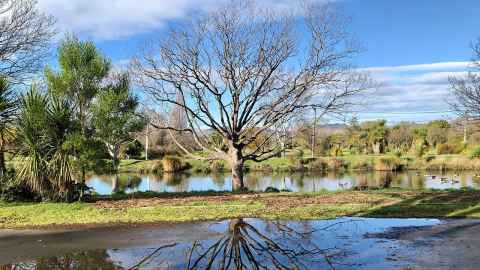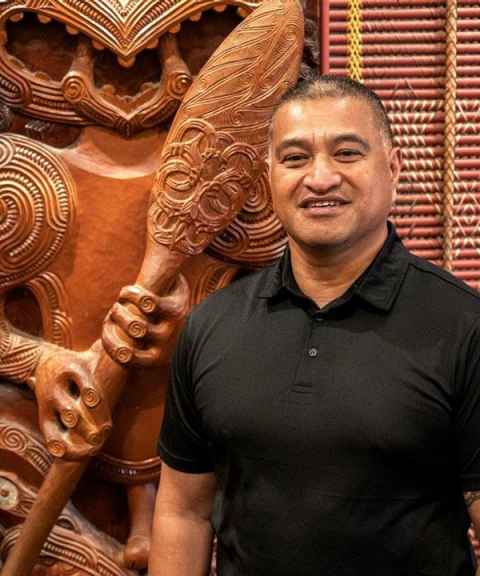Christchurch red zone and Māori in sport: Marsdens
3 November 2022
Two Faculty of Arts projects focused on ways to help people and the environment flourish have won Marsden funding worth $1.74 million.

How Christchurch’s residential red zone could be a ‘petri dish for the world’ and ways to flourish culturally as Māori in mainstream sport are two Faculty of Arts projects that have been funded from e Pūtea Rangahau a Marsden, the Marsden Fund.
The 2010 Ōtautahi-Christchurch earthquake gave the city’s poorest suburbs the equivalent of half a century of sea-level rise in a single hit, and the resulting ‘managed retreat’ has led to the creation of the residential red zone (RRZ), 602 hectares of land along the Avon Ōtākaro River Corridor (AORC).
Sociologist Professor Steve Matthewman, Associate Professor Luke Goode and their team have won an $870,000 Marsden Standard grant to ask if the red zone can become Aotearoa’s biggest social infrastructure project: a site of diverse interactions, shared participation, and social cohesion? Or will green gentrification displace the relatively deprived communities of the river corridor?
Twice the size of New York’s Central Park, the beautiful area cost $2.6 billion to create and has hundreds of millions more committed to developing it over the coming decades.
“It’s potentially a democratic commons,” says Professor Matthewman, “and can’t be privately owned. It’s also been hailed as ‘Christchurch’s field of dreams’ and ‘a petri dish for the world.’”
Drawing on key-informant interviews, digital storytelling, photography and aerial mapping, the team will look at all the possibilities that emerge for this vast and important area in the middle of the city, referred to as a “space of hope".
He says ideas for its use already include adventure tourism, community gardening, ecological restoration and ‘urban greening’ - open-space areas reserved for parks and other green spaces.
Drawing on key-informant interviews, digital storytelling, photography and aerial mapping, the team will look at all the possibilities that emerge for this vast and important area in the middle of the city, referred to as a “space of hope”.
“We would like our collectively generated knowledge to provide innovative understanding, practical guidance and policy considerations for people all over the world who are planning to transition their city spaces into more culturally safe, inclusive and sustainable places.”
Being culturally Māori in mainstream sport
How can mainstream sports like rugby, netball and touch become ‘mana-enhancing’ spaces where Māori can belong as themselves, feel connected and flourish?
Associate Professor Mohi Rua (Tūhoe, Ngāti Awa, Ngāti Whakaue), who is based in Māori Studies at the Faculty of Arts and is also part of Ngā Pae o te Māramatanga’s Kāhui Ārahi (research leadership team), leads a small team of researchers, including co-principal investigator Dr Jeremy Hapeta (Otago University), Luke Rowe (Massey University) and Dr Isaac Warbrick (AUT).
They have won a Marsden Standard grant of $870,000 to explore how these hugely popular sports can be realigned to enable Māori self-determination and participation as culturally Māori.
“This means not simply being treated as a sportsperson, coach or administrator who happens to be Māori, but to fully participate as culturally Māori within mainstream sports,” says Associate Professor Rua.
“Māori experiences of being marginalised, stereotyped and ‘othered’ within mainstream sports is not new, yet sport continues to attract Māori in large numbers from across all age groups, socio-economic levels and regions.”
He says for Māori, sports and activities with whakapapa Māori (Māori genealogy) like waka ama, ki-ō-rahi, kapa haka and mau rākau are significant for realising core Māori aspirations; namely, to live as culturally Māori in Te Ao Māori (the Māori world), while also living in mainstream colonial society.

However, he says there is scant research on the potential of mainstream sports to foster Māori participation as culturally Māori.
“Mainstream sports are those without whakapapa Māori (Māori genealogy), introduced to Aotearoa through colonisation, and where the organisational structures are often founded on Pākehā cultural ways of being and knowing. As a microcosm of society, these practices play a significant part in how we as Māori experience sport.”
He says mainstream sporting cultures rarely align with Māori values and practices outside of the commodification of Māori objects and customs, including haka.
“Being Māori in mainstream sport is to adapt to the political and socio-cultural needs of the dominant group, where we as Māori are either forced, or feel compelled, to leave our cultural selves or indigeneity at home and assimilate into dominant Pākehā practices.”
We hope the findings from this study will contribute to a uniquely Māori (indigenous) framework for participation in mainstream sports that can act as a vehicle for decolonisation, transformation and wellbeing for Māori.
Dr Rua and a small team of Kaupapa Māori researchers plan to map out the sports eco-system (‘sportscape’) that enables Māori to engage in mainstream sport at local, regional, national, and international levels.
They will then investigate three case studies that draw on Kaupapa Māori approaches, mātauranga Māori (epistemologies and practices) and kōrero tuku iho (oral histories) to unpack how Māori can participate in mainstream sports as culturally Māori.
Using lessons from these studies, they want to contribute to a fundamental paradigm shift within mainstream sports that is underpinned by Māori ways of being and knowing.
Ngā Pae o te Māramatanga is a New Zealand's Māori Centre of Research Excellence (CoRE).
Marsden success
A total of 36 University of Auckland researchers have been successful in this year’s Marsden round, with 14 having been awarded Fast Start grants worth $5.04 million and 22 Standard grants worth $19,275 million.
Te Pūtea Rangahau a Marsden, the Marsden Fund, is managed by Royal Society Te Apārangi on behalf of the government.
Media contact
Julianne Evans | Media adviser
M: 027 562 5868
E: julianne.evans@auckland.ac.nz